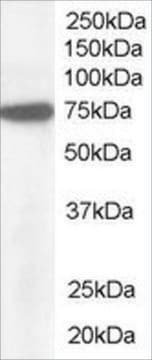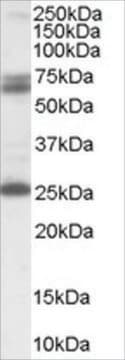SAB4200232
Anti-GAD65 antibody , Mouse monoclonal
clone N-GAD65, purified from hybridoma cell culture
Synonym(s):
Anti-GAD2, Anti-glutamate decarboxylase 2 (pancreatic islets and brain, 65kDa), Anti-glutamate decarboxylase 65 kDa isoform
About This Item
Recommended Products
biological source
mouse
conjugate
unconjugated
antibody form
purified from hybridoma cell culture
antibody product type
primary antibodies
clone
N-GAD65, monoclonal
form
buffered aqueous solution
mol wt
antigen ~65 kDa
species reactivity
human, mouse, monkey, rat
concentration
~1.0 mg/mL
technique(s)
immunohistochemistry: suitable
immunoprecipitation (IP): suitable
western blot: 0.25-0.5 μg/mL using whole extracts of rat brain
isotype
IgG1
UniProt accession no.
shipped in
dry ice
storage temp.
−20°C
target post-translational modification
unmodified
Gene Information
human ... GAD2(2572)
mouse ... Gad2(14417)
rat ... Gad2(24380)
Related Categories
General description
Application
Biochem/physiol Actions
Physical form
Disclaimer
Not finding the right product?
Try our Product Selector Tool.
recommended
Storage Class Code
12 - Non Combustible Liquids
WGK
WGK 1
Flash Point(F)
Not applicable
Flash Point(C)
Not applicable
Certificates of Analysis (COA)
Search for Certificates of Analysis (COA) by entering the products Lot/Batch Number. Lot and Batch Numbers can be found on a product’s label following the words ‘Lot’ or ‘Batch’.
Already Own This Product?
Find documentation for the products that you have recently purchased in the Document Library.
Our team of scientists has experience in all areas of research including Life Science, Material Science, Chemical Synthesis, Chromatography, Analytical and many others.
Contact Technical Service








